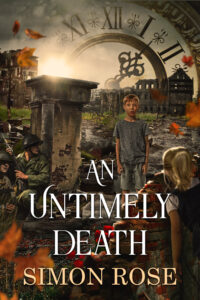Historical Background
 The story, main characters, and some of the settings in An Untimely Death are fictional, but are based on true events that took place in World War II.
The story, main characters, and some of the settings in An Untimely Death are fictional, but are based on true events that took place in World War II.
These are links to online sources where you can learn more about the historical events, settings, and leading characters from World War II that are featured in the story, Canada’s role in the conflict, locations that are mentioned in the text, life during the war, and details from the various military campaigns and other historical periods that are mentioned in the novel.
Please note that all links were fully operational at the time of the book’s completion.
Canada in World War II
Right from the beginning, Canada was involved in World War II. Canadians fought on land, at sea, and in the air in Europe and in Asia. More than a million men and women served in the Canadian armed forces during the war and over 43,000 were killed.
http://www.thecanadianencyclopedia.ca/en/article/second-world-war-wwii/
https://en.wikipedia.org/wiki/Canada_in_World_War_II
http://www.thecanadianencyclopedia.ca/en/article/first-canadian-army/
https://www.thecanadianencyclopedia.ca/en/timeline/second-world-war-timeline
https://www.veterans.gc.ca/eng/remembrance/classroom/fact-sheets/wwchronol
D-Day
Canadian forces landed at Juno Beach during the massive Allied invasion of Normandy on June 6, 1944. Following the invasion, Canadian soldiers were involved in many battles against the German forces in northern France.
https://en.wikipedia.org/wiki/Juno_Beach
https://www.thecanadianencyclopedia.ca/en/article/normandy-invasion
https://www.thecanadianencyclopedia.ca/en/article/juno-beach
http://www.junobeach.info/juno-4-0.htm
http://www.junobeach.info/juno-6.htm
https://www.junobeach.org/canada-in-wwii/articles/d-day/
https://kids.kiddle.co/Operation_Overlord
https://kids.kiddle.co/Juno_Beach
The Liberation of the Netherlands
After fighting to drive the Germans out of France, the Canadian armed forces helped to defeat the enemy in Belgium, liberate the Netherlands, and push German forces back across the Rhine before the war ended.
https://en.wikipedia.org/wiki/Netherlands_in_World_War_II
https://en.wikipedia.org/wiki/Dutch_famine_of_1944%E2%80%931945
http://www.thecanadianencyclopedia.ca/en/article/liberation-of-holland/
https://www.veterans.gc.ca/eng/remembrance/battles-and-stages/liberation-of-netherlands
https://www.warmuseum.ca/liberation/
https://en.wikipedia.org/wiki/Battle_of_the_Scheldt
http://www.thecanadianencyclopedia.ca/en/article/battle-of-the-rhineland/
https://www.canadiansoldiers.com/history/campaigns/northwesteurope/rhineland.htm
https://legionmagazine.com/en/fighting-in-the-rhineland/
Canada and the Netherlands
Important and lasting connections between Canada and the Netherlands were forged during World War II. Queen Wilhelmina of the Netherlands fled to Britain following the German invasion and from London became a symbol of the Dutch resistance to the German occupation. Her daughter, Princess Juliana, lived in Canada during World War II and became Queen of the Netherlands in 1948. After the war, 100,000 tulip bulbs were sent by the Netherlands to Ottawa to thank Canada for their support in World War II.
The Canadian Tulip Festival is one of the most enduring reminders of the connections between Canada and the Netherlands, which were first established following World War II. The festival takes place each May in Ottawa.
https://en.wikipedia.org/wiki/Wilhelmina_of_the_Netherlands
https://en.wikipedia.org/wiki/Juliana_of_the_Netherlands
https://en.wikipedia.org/wiki/Canadian_Tulip_Festival
https://ottawatourism.ca/en/see-and-do/canadian-tulip-festival
William Lyon Mackenzie King
William Lyon Mackenzie King was Canada’s prime minister during World War II. He served as prime minster for twenty-one years, which is longer than anyone else to date. King’s third term in office began in 1935 and he was the country’s prime minister all through World War II.
https://www.britannica.com/biography/W-L-Mackenzie-King
http://www.biographi.ca/en/bio/king_william_lyon_mackenzie_17E.html
https://www.junobeach.org/canada-in-wwii/articles/w-l-mackenzie-king/
https://kids.britannica.com/kids/article/Mackenzie-King/438299
https://en.wikipedia.org/wiki/William_Lyon_Mackenzie_King
Military Medals and Decorations
A large variety of military medals and decorations were awarded during World War II. These included medals awarded to soldiers following their participation in certain campaigns as well as medals awarded to individuals for bravery in the field, such as the Military Medal that’s featured in the novel.
https://www.veterans.gc.ca/eng/remembrance/medals-decorations/wearing-medals/ww11medals
https://www.warmuseum.ca/tilston-medals-collection/medals/
https://www.identifymedals.com/database/medals-by-country/great-britain-medals/the-military-medal/
https://www.veterans.gc.ca/eng/remembrance/medals-decorations/details/53
https://en.wikipedia.org/wiki/Military_Medal
https://en.wikipedia.org/wiki/Victoria_Cross_(Canada)
The Military Museums
The Military Museums in Calgary is the largest museum of the Army, Navy, and Air Force in Western Canada and the second largest military museum in the country.
https://themilitarymuseums.ca/
https://en.wikipedia.org/wiki/The_Military_Museums
The Juno Beach Centre
The Juno Beach Centre is a museum located in Normandy, France, founded by Canadian veterans. It’s situated where Canadian soldiers landed on D-Day. The Juno Beach Centre tells the story of Canada’s role in World War II and honours those that served in the conflict.
https://www.veterans.gc.ca/eng/remembrance/memorials/overseas/second-world-war/france/junobeach
Prior to D-Day and the fighting in France and the Netherlands, Canadian forces took part in a number of military operations against the enemy.
The Battle of the Atlantic
Canada played a leading role in the Battle of the Atlantic during the war. Royal Canadian Navy vessels protected Allied supply ships sailing across the Atlantic in convoys to ports in Great Britain and to the Soviet Union. Canadian ships and aircraft also hunted German U-boats in the North Atlantic during the war.
https://www.ducksters.com/history/world_war_ii/battle_of_the_atlantic.php
https://www.iwm.org.uk/history/what-you-need-to-know-about-the-battle-of-the-atlantic
https://www.cbf-fccb.ca/the-cbf-battlefield-tour/learn-canadas-role-in-world-war-2/the-atlantic/
https://www.veterans.gc.ca/eng/remembrance/classroom/fact-sheets/atlantic
https://www.thecanadianencyclopedia.ca/en/article/u-boat-operations
http://www.junobeach.org/canada-in-wwii/articles/convoys/
http://www.junobeach.org/canada-in-wwii/articles/anti-submarine-detection/
https://uboat.net/technical/schnorchel.htm
The Dieppe Raid
In 1942, Canadian troops took part in their first military operation of the war in Europe. Allied forces launched a raid against the French port of Dieppe, testing the defenses that the Germans had set up on the continent.
https://www.thecanadianencyclopedia.ca/en/article/dieppe-raid
https://www.junobeach.org/canada-in-wwii/articles/the-dieppe-raid/
https://en.wikipedia.org/wiki/Dieppe_Raid
https://www.veterans.gc.ca/eng/remembrance/wars-and-conflicts/second-world-war/battle-of-dieppe
Italy and Sicily
The invasion of Sicily and Italy in 1943 was another operation in which Canadian forces were heavily involved. Canadian troops fought in many battles that were part of the Italian campaign, which continued until the end of the war.
https://www.cbf-fccb.ca/the-cbf-battlefield-tour/learn-canadas-role-in-world-war-2/italy-and-sicily/
https://www.veterans.gc.ca/eng/remembrance/history/second-world-war/canada-Italy-1943-to-1945
https://www.thecanadianencyclopedia.ca/en/article/italian-campaign
https://en.wikipedia.org/wiki/Allied_invasion_of_Sicily
https://en.wikipedia.org/wiki/Italian_campaign_(World_War_II)
Weapons, Equipment, and Uniforms
On these pages, you can learn more about the weapons and equipment used by Canadian soldiers in World War II, including tanks, grenades, rifles, machine guns, small arms, and uniforms.
http://www.militaryfactory.com/armor/ww2-canadian-tanks.asp
http://www.junobeach.info/juno-7.htm
http://www.canadiansoldiers.com/weapons/rifles.htm
http://www.canadiansoldiers.com/weapons/grenades/handgrenades.htm
http://www.canadiansoldiers.com/weapons/lightweapons/brengun.htm
http://www.junobeach.org/canada-in-wwii/arms-weapons/
http://www.militaryfactory.com/smallarms/detail.asp?smallarms_id=61
http://www.canadiansoldiers.com/weapons/smgs/sten.htm
http://www.canadiansoldiers.com/vehicles/tanks/mainbattletanks.htm
http://www.canadiansoldiers.com/uniforms/uniform.htm
https://www.canadiansoldiers.com/uniforms/battledress.htm
http://www.canadiansoldiers.com/uniforms/boots.htm
https://www.warmuseum.ca/s3/supplyline/assets/swwteacherresources/AB8.1-Eng-BattleDressJacket.pdf
https://canadaatwar.weebly.com/canadian-battle-dress.html
http://www.germanmilitaria.com/OtherNations/CanUniform.html
http://www.medalsgonemissing.com/Uniform-Kit-issued-to-the-Canadian-Army-During-WW2.html
http://www.junobeach.org/canada-in-wwii/articles/an-infantrymans-basic-kit/
http://www.canadiansoldiers.com/equipment/loadbearing/1937pattern.htm



